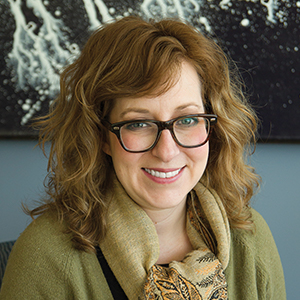2022 cohort of NIH MOSAIC scholars
The American Society for Biochemistry and Molecular Biology welcomed five new scholars to the society’s second cohort for the Maximizing Opportunities for Scientific and Academic Independent Careers, or MOSAIC, program.
In August 2020, the society received a cooperative agreement with the National Institutes of Health’s National Institute of General Medical Sciences to develop and execute a program that will support postdoctoral fellows and new investigators from diverse backgrounds embarking on careers at research-intensive institutions. (Read about the $1.27 million award here.)
In February 2021, the society welcomed seven scholars; in August 2021, the society welcomed another five.
Kirsten Block, the ASBMB’s director of education, professional development and outreach, is principal investigator for the program.
“We are excited to establish our second cohort of MOSAIC scholars and look forward to meeting and working with all of them during this important time in their career development,” Block said. “In many ways, we have learned as much from our first cohort as they have learned from us. The lessons we have learned in our continued support of our first cohort will strengthen our approach in working with our newest scholars over the next several years. To watch the scholars support each other has been incredibly rewarding, and I am proud of the community of scientists that ASBMB has cultivated through this program.”
Asiya Gusa
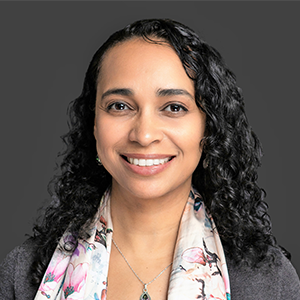
Asiya Gusa is a postdoctoral researcher in the lab of Sue Jinks–Robertson at Duke University, where she is studying stress adaptation in the human fungal pathogen Cryptococcus.
Gusa was raised in Columbus, Ohio, where she was introduced to research in high school through an apprenticeship program at Ohio State University. She earned a bachelor’s in microbiology at Miami University in Ohio in 1999.
She moved to Emory University in Atlanta as a UNCF–Merck fellow to pursue her Ph.D. in microbiology and molecular genetics. There she worked in the lab of June R. Scott on gene regulation and DNA binding of a regulatory protein in Streptococcus pyogenes. She earned her doctorate in 2006.
Gusa completed a fellowship in emerging infectious diseases at the Centers for Disease Control and Prevention and was a lecturer, instructor and diversity coordinator for about a decade at several colleges and schools in the South before joining Duke as a postdoc in 2018. Gusa lives in Durham, North Carolina, with her spouse and two high-school teenagers.
“I look forward to joining a cohort of scholars with a shared interest in making meaningful contributions to science and increasing diversity within the talent pool of researchers. I believe mentorship and peer support are key factors for ensuring success in the pursuit of biomedical research careers,” she said.
Read about her MOSAIC project, “Stress-induced transposon mobilization in the human fungal pathogen Cryptococcus.”
Christopher D. Radka
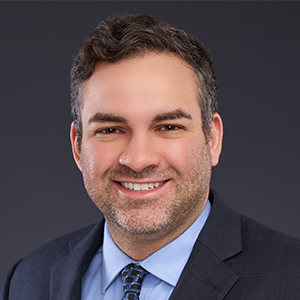
Christopher D. Radka is a postdoctoral researcher in the lab of Charles O. Rock in the infectious diseases department of St. Jude Children’s Research Hospital, where he is studying lipid biochemistry.
Radka is a Honduran American raised in Central Florida, where his family created and still runs a nonprofit called HopeNow Foundation that provides health screenings, runs youth programs, and conducts environmental and humanitarian projects.
Radka earned his bachelor’s in biotechnology, molecular biology and microbiology in 2011 at the University of Central Florida. He won entry to the University of Alabama at Birmingham’s Equity and Diversity Enhancement Program fellowship and participated in a NASA project that examined the influence of microgravity on protein crystal growth.
During his graduate studies of microbiology and structural biology, Radka was co-mentored by Stephen Aller and Lawrence DeLucas. He earned his Ph.D. in 2017. He also earned two graduate certificates, one in technology commercialization and entrepreneurship and another in education, at UAB.
At St. Jude, Radka is a founding member and co-chair of the Black Employees and Allies Resource Group. He’s also a contributor to ASBMB Today. He lives in Memphis with his wife and two children.
“As a product of public education, I am humbled to receive this competitive MOSAIC K99 support to continue my postdoctoral training, and I’m excited to receive the professional development and coaching from the ASBMB MOSAIC program,” he said. “The opportunity to be a MOSAIC scholar will amplify my efforts as a principal investigator to promote diversity and inclusion in science, education and career advancement.”
Read about his MOSAIC project, “Bacterial anti-inflammatory lipid mediators.”
Chrystal Starbird
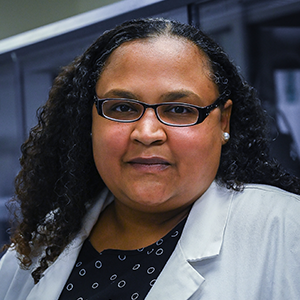
Chrystal Starbird is a postdoctoral researcher in the lab of Kathryn Ferguson at the Yale Cancer Biology Institute, where she is studying the structural basis for activation of TAM receptor tyrosine kinases.
Starbird learned to love nature as a kid in Brookline, Massachusetts — so much so that she started a nature club in second grade.
She moved south to the University of North Carolina at Chapel Hill to pursue her undergraduate degree in biology, which she earned in 2008, and then spent a few years working in multiple labs in academia and industry before returning to UNC for a postbaccalaureate program.
She earned her Ph.D. in chemical and physical biology under the direction of Tina Iverson at Vanderbilt University in 2016.
Starbird is co-founder of the Yale Black Postdoctoral Association and Intersections Science Fellows Symposium.
“I am beyond excited to join the ASBMB cohort for the NIH MOSAIC award. I’ve always dreamed of launching an independent research career following graduate school and my postdoctoral work, and this program will help to make that dream a reality,” Starbird said. “Not only will I have funding support but also guidance and mentorship from the ASBMB community. Beyond this, I truly look forward to getting to know all of the postdocs in my cohort and building a community that can support each other as we transition to the next phase of our careers and beyond.”
Her MOSAIC project will use structural, biophysical and biochemical approaches to investigate oligomerization in a family of receptor tyrosine kinases and TAM receptors’ interactions with co-receptors.
Kiesha Wilson
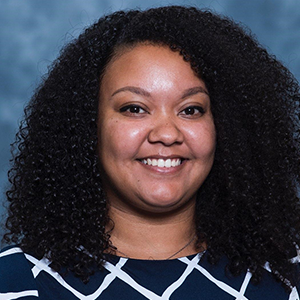
Kiesha Wilson is a postdoctoral researcher in the lab of Mitzi Nagarkatti and Prakash Nagarkatti at the University of South Carolina School of Medicine, where she is studying inflammatory diseases and treatments with natural plant products.
A native of West Columbia, South Carolina, Wilson credits a middle school field trip to a local hospital pathology lab with igniting her interest in science.
She earned her bachelor’s in microbiology at Clemson University in 2013, during which time she also had a daughter. She did a short stint as an industry microbiologist before matriculating into the University of South Carolina Postbaccalaureate Research Education Program and earning a Ph.D. in biological sciences in 2019.
Wilson volunteers as a mentor for the Science, Mathematics, and Research for Transformation Defense Scholarship Program at the school of medicine and for both the New Hope Leadership Academy and Empowerment Strategies.
“I am elated to be a part of the ASBMB MOSAIC cohort, which includes so many talented and diverse scholars. I fondly anticipate networking with the other MOSAIC scholars, mentors, and ASBMB members, as I expect there will be a plethora of information to be shared amongst our community,” she said. “The NIH MOSAIC program will ease the transition from postdoctoral fellow to independent research faculty via financial support, career development and scientific training. As a result, I will become a better scientist, mentor and advocate for STEM education amongst underrepresented minority populations.”
Her MOSAIC project focuses on the role of macrophages in cannabidiol, or CBD, in acute respiratory distress syndrome induced by Staphylococcus enterotoxin B.
Rahel A. Woldeyes
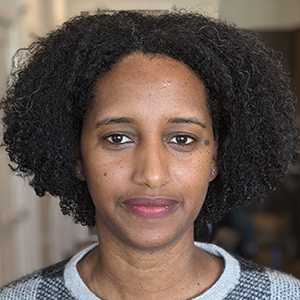
Rahel A. Woldeyes is a postdoctoral researcher in the lab of Wah Chiu at Stanford University, where she is adapting cutting-edge structural biology techniques to accelerate our understanding of the molecular mechanisms leading to cardiovascular diseases.
Woldeyes’ passion for research was ignited as a young child by her desire to understand the cause of her father’s diabetes. This motivated her to pursue biomedical research as a career, and she first earned a bachelor’s degree in biochemistry and chemistry at the University of Minnesota, Twin Cities in 2011. She went on to do her graduate work in the lab of James Fraser at the University of California, San Francisco, as a National Science Foundation graduate research fellow, earning her Ph.D. in 2017.
Woldeyes has experience with mentoring, teaching and outreach to underrepresented students “with the goal of exposing students to biomedical research as a career option and empowering students to pursue their career goals,” she said.
“I’m thrilled to be part of the NIH MOSAIC program. I’m looking forward to building a strong support network with other MOSAIC scholars. I will also use the training and resources provided by ASBMB to further develop my goals as I transition to an independent career.”
Read about her MOSAIC project, “Cryo-electron tomography to determine crosstalk mechanisms of calcium channels in cardiomyocytes.”
Enjoy reading ASBMB Today?
Become a member to receive the print edition four times a year and the digital edition monthly.
Learn moreFeatured jobs
from the ASBMB career center
Get the latest from ASBMB Today
Enter your email address, and we’ll send you a weekly email with recent articles, interviews and more.
Latest in Careers
Careers highlights or most popular articles

Upcoming opportunities
ASBMB's PROLAB award helps graduate students and postdoctoral fellows spend up to six months in U.S. or Canadian labs.

From humble beginnings to unlocking lysosomal secrets
Monther Abu–Remaileh will receive the ASBMB’s 2026 Walter A. Shaw Young Investigator Award in Lipid Research at the ASBMB Annual Meeting, March 7-10 in Washington, D.C.

Chemistry meets biology to thwart parasites
Margaret Phillips will receive the Alice and C. C. Wang Award in Molecular Parasitology at the ASBMB Annual Meeting, March 7-10 in Washington, D.C.

Decoding how bacteria flip host’s molecular switches
Kim Orth will receive the Earl and Thressa Stadtman Distinguished Scientists Award at the ASBMB Annual Meeting, March 7–10, just outside of Washington, D.C.

Defining JNKs: Targets for drug discovery
Roger Davis will receive the Bert and Natalie Vallee Award in Biomedical Science at the ASBMB Annual Meeting, March 7–10, just outside of Washington, D.C.

Upcoming opportunities
No matter where you are in your career and what future path you aspire to, everyone needs leadership skills. Join ASBMB for practical strategies for building and practicing leadership skills.

